Understanding Teen Internet Addiction
In today’s digital world, it’s common for teenagers to spend significant time online. However, when this usage becomes excessive and compulsive, it can lead to internet addiction—a growing concern for parents, educators, and mental health professionals. Recognizing the signs of this addiction is crucial for early intervention and support. This article outlines seven key symptoms of teen internet addiction, providing insight into how it impacts their lives.
Key Facts on Excessive Internet Use and Teenagers
- Teens spend an average of 7 hours and 22 minutes online daily, impacting responsibilities.
- 73% of high school students experience sleep deprivation due to excessive internet use.
- Signs of internet addiction include irrationality, isolation, and neglect of responsibilities.
- 59% of teens report their internet use interferes with academic performance.
- Poor personal hygiene and self-care are linked to prioritizing online activities over tasks.
- Withdrawal symptoms include restlessness, anxiety, and mood swings when offline.
- Excessive internet use can lead to a decline in emotional well-being, increasing feelings of loneliness.
- Teenagers who prefer online interactions may experience deterioration in real-life social skills.
- Physical symptoms from internet overuse include headaches, eye strain, and poor posture.
- Addressing internet addiction is essential to restore balance and improve mental and physical health.
1. Excessive Time Spent Online
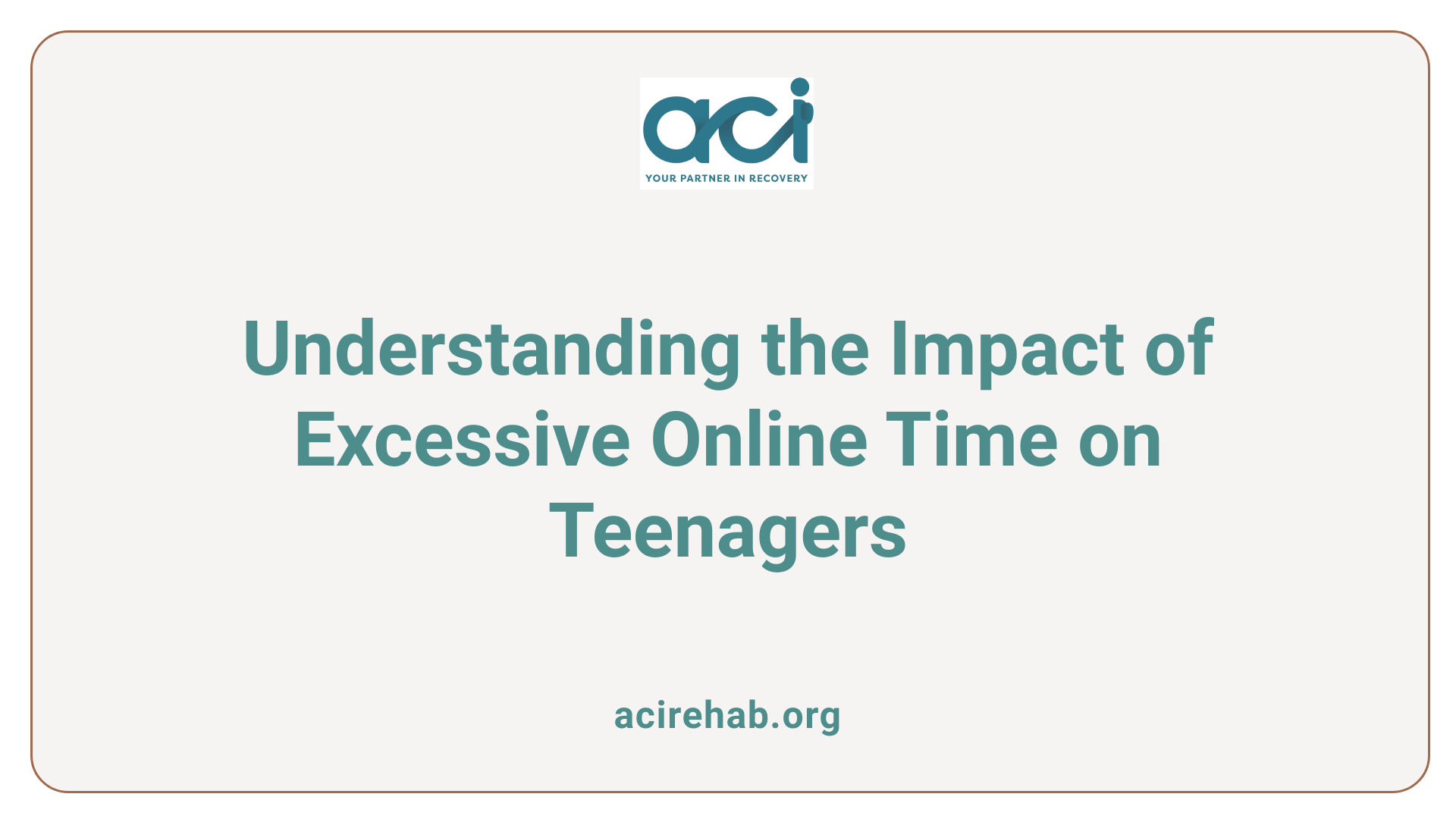
How excessive online time can interfere with daily responsibilities
The surge in internet usage among teenagers has created a widespread concern regarding its impact on their daily responsibilities. Teens today frequently find themselves glued to their screens, dedicating an average of seven hours and 22 minutes to various online activities daily. This excessive time can lead to a lack of focus on schoolwork, resulting in lower academic performance and grades.
As online engagement becomes the primary mode of interaction, teens may neglect essential responsibilities like household chores and even their personal hygiene. The compulsion to check notifications or jump into gaming or social media often takes precedence over homework, leading to conflicts between internet use and daily obligations. The result is a cycle of procrastination, where the demands of schoolwork and real-life responsibilities are repeatedly pushed aside.
Connection between excessive internet use and lack of sleep
A notable consequence of excessive internet use is its correlation with sleep deprivation. Many teenagers sacrifice their sleep in favor of late-night online activities, which can lead to disrupted sleep patterns and fatigue. Studies suggest that nearly 73% of high school students don’t get enough sleep, which significantly affects their overall well-being and cognitive function.
Teens struggling with internet addiction often exhibit signs such as irritability when offline and a compulsive need to stay connected, resembling withdrawal symptoms seen in substance use disorders. This compulsiveness can lead to emotional instability, impaired concentration during the day, and an inability to participate actively in both academic and social settings. Therefore, it’s critical to establish balanced internet usage to ensure healthy sleep patterns and maintain focus on daily responsibilities.
| Issue | Symptoms | Implications |
|---|---|---|
| Excessive Online Time | Preoccupation with online activities | Poor academic performance, strained responsibilities |
| Sleep Deprivation | Irritability, fatigue | Impacted cognitive function, emotional distress |
| Neglect of Hygiene | Lack of self-care | Decline in personal health and well-being |
| Disrupted Relationships | Isolation, social withdrawal | Emotional distance, loneliness |
The connection between prolonged internet use and disrupted routines illustrates the necessity of monitoring screen time to foster healthier habits among teenagers.
Symptoms of internet addiction in teenagers
The symptoms of internet addiction in teenagers include preoccupation with online activities, excessive time spent on the internet, and a loss of control over their online behavior. Teenagers may experience withdrawal symptoms like irritability and anxiety when they are offline, along with physical health issues such as fatigue, sleep problems, and muscle aches. There may also be signs of neglecting real-life responsibilities, such as poor academic performance and declining personal hygiene. Socially, they might withdraw from face-to-face interactions, leading to emotional distance in personal relationships. Overall, internet addiction can significantly impact teenagers’ mental and physical health, contributing to issues like anxiety, depression, and social isolation.
2. Neglect of Responsibilities
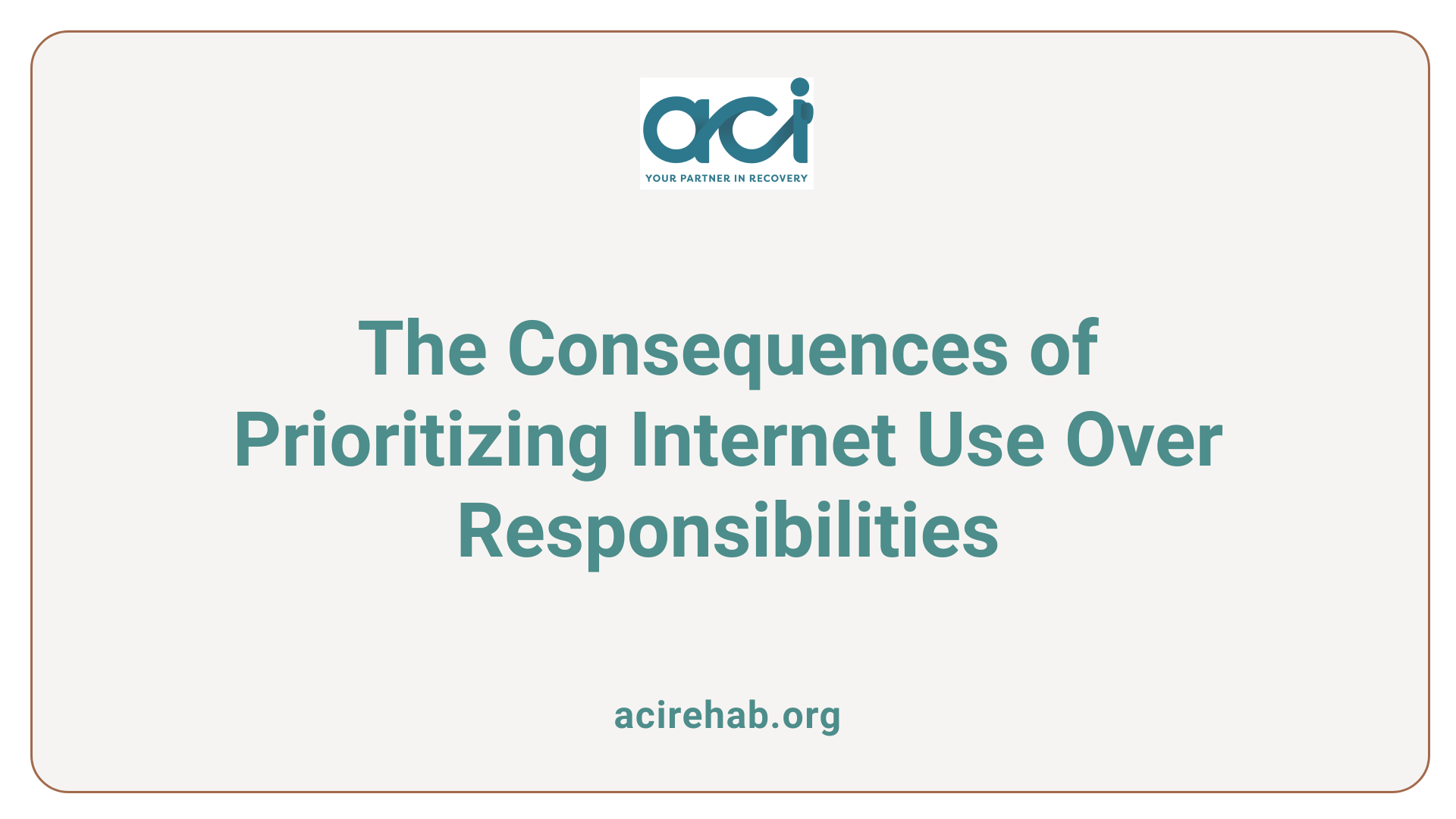
Teenagers Prioritizing Internet Use Over Duties
Many teenagers today find themselves caught in a cycle of excessive internet usage, often prioritizing online activities over essential day-to-day responsibilities. This neglect can manifest in several ways, from poorly completed school assignments to a lack of attention to personal hygiene. With the internet providing constant stimulation and engagement through social media, gaming, and streaming services, teens may begin to drift away from their real-life obligations.
One crucial aspect of this behavior is the preoccupation with being online. Teenagers frequently express a strong desire to stay connected, sometimes at the expense of their tasks. Studies show that many teens find themselves neglecting homework or chores, leading to a deterioration in academic performance and strained family relationships.
Impact on School Performance and Personal Obligations
The effects of internet addiction on school performance are particularly concerning. Excessive time spent online can result in a significant decline in grades and a lack of motivation to engage with educational materials. Teens may find it challenging to concentrate during classes, as lingering thoughts about social media notifications or gaming activities invade their focus.
A recent survey indicated that nearly 60% of teens report feeling that their internet use interferes with their studies. Additionally, responsibilities such as sports practice, part-time jobs, or family events can often take a backseat. This negligence not only harms academic outcomes but also affects social skills as teens withdraw from real-world interactions, preferring virtual ones instead.
Here is a table summarizing the impact of internet use on responsibilities:
| Responsibility Area | Effect of Internet Addiction | Possible Consequence |
|---|---|---|
| Academic Performance | Decreased focus and lower grades | Academic decline |
| Personal Hygiene | Neglect of personal grooming | Decline in self-esteem |
| Social Interactions | Preference for online engagement over face-to-face interactions | Isolation and loneliness |
| Family Obligations | Missed family events or chores | Strained family relationships |
Recognizing the signs of internet addiction in teenagers is essential to help them restore balance in their lives and reclaim their responsibilities. Creating designated tech-free times or tech-free zones may assist in fostering healthier internet habits.
3. Withdrawal Symptoms
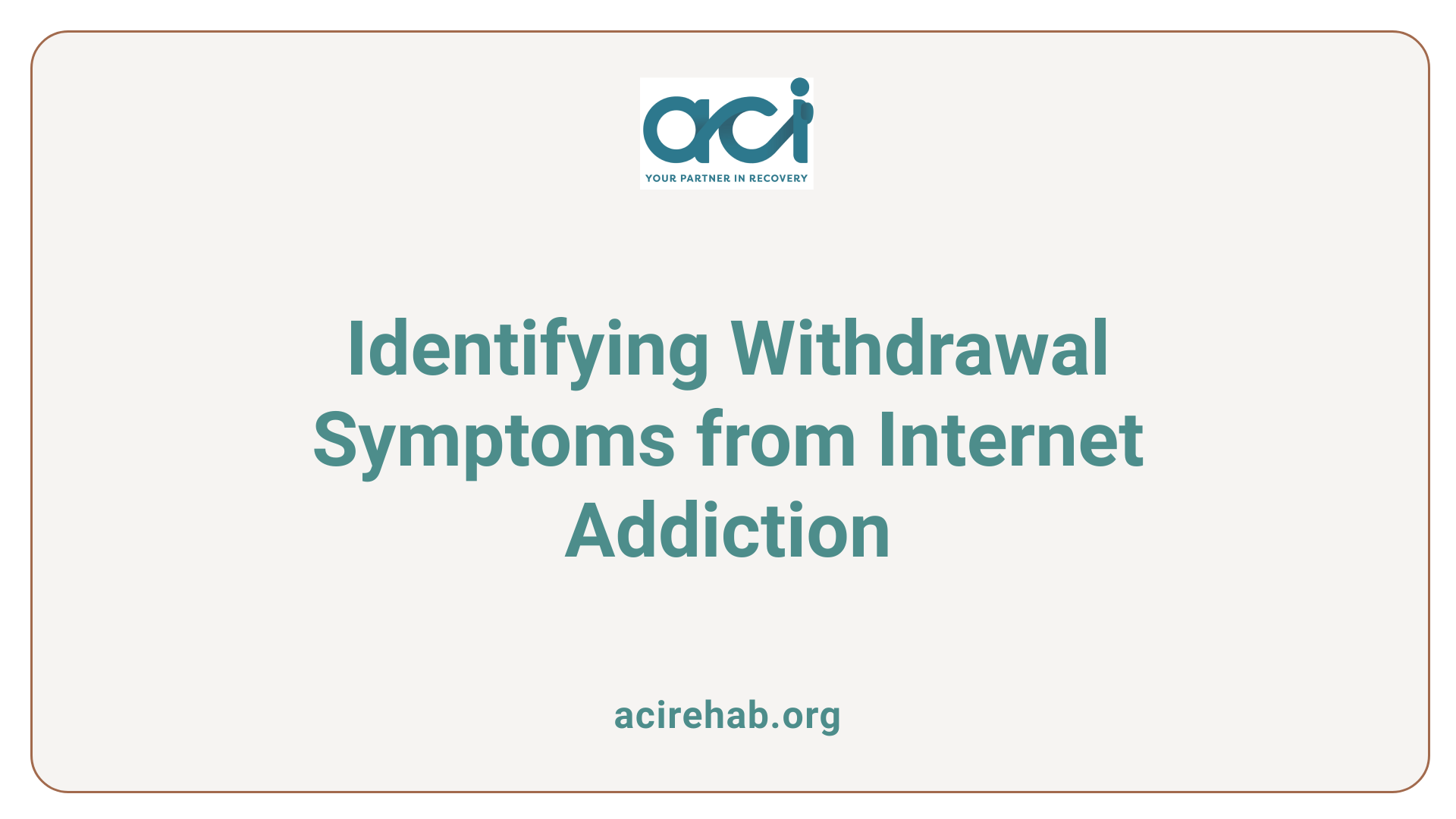
Symptoms When Unable to Use the Internet
Withdrawal symptoms manifest prominently when teens are disconnected from the internet. These reactions can be disruptive, leading to significant emotional distress. When deprived of internet access, teenagers may experience:
- Restlessness: A persistent feeling of agitation, making it hard for them to settle into other activities.
- Anxiety: An increase in feelings of worry or unease, as the absence of online engagement triggers concerns about missing out on social interactions or important updates.
- Mood Swings: Sudden changes in emotional state, which can fluctuate between irritability and sadness.
- Concentration Difficulties: A struggle to focus on tasks unrelated to internet usage due to preoccupation with online activities.
Irritability and Restlessness as Withdrawal Signs
Irritability becomes a common indicator of withdrawal and a strong signal of dependency on internet use. Teens may react negatively when their ability to connect online is interrupted. Typical behaviors may include:
- Increased Agitation: Quick to become angry or frustrated over minor distractions, particularly those causing interruptions in their online activities.
- Persistent Cravings for Internet: An overwhelming urge to go online, which can lead to feelings of frustration and disappointment when this is not possible.
- Social Withdrawal: Avoiding family and friends in favor of online engagements, which reinforces isolation and makes it challenging to reconnect offline.
The compulsion linked to these withdrawal symptoms resembles behaviors seen in more traditional forms of addiction, emphasizing the serious nature of internet dependence in teens. Recognizing these symptoms is crucial for parents and caregivers in facilitating timely intervention and support.
4. Isolation from Offline Activities
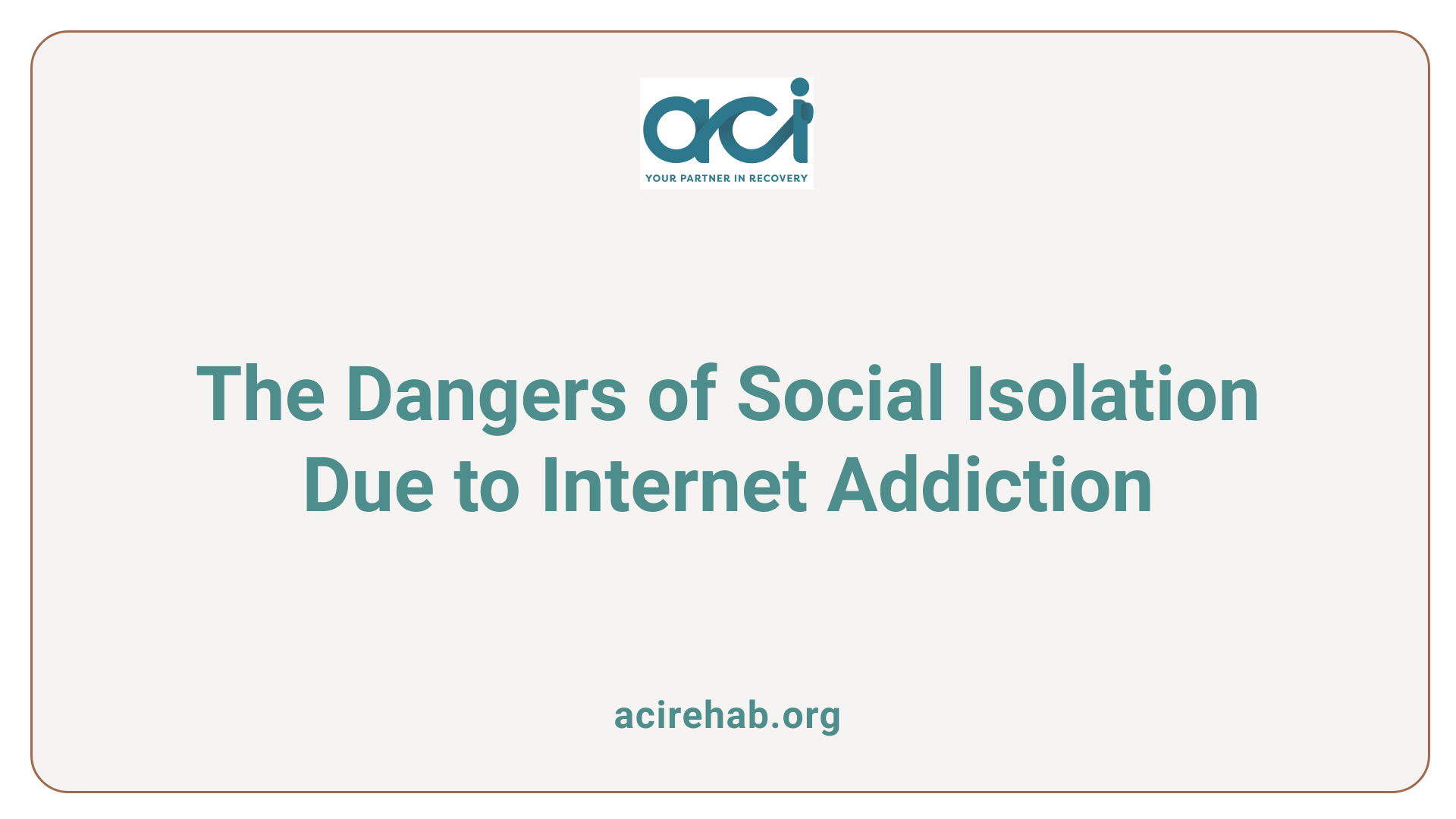
Preference for Online Interactions Over Real-World Engagement
Teenagers dealing with internet addiction often favor interactions through screens rather than engaging in person with friends and family. This preference can lead to significant social withdrawal, where online activities, such as gaming and social media, take precedence over face-to-face relationships. The engrossing nature of digital interactions can create a false sense of fulfillment, making real-life connections feel less appealing.
This pattern of behavior contributes to a cycle of isolation, where adolescents neglect offline activities they once enjoyed. As the tendency to manage relationships primarily through digital means increases, the skills necessary for effective communication in real-life situations may diminish.
Effects on Personal Relationships and Social Skills
The impact on personal relationships can be substantial; friendships might weaken or even evaporate due to the lack of physical presence. Many teens experience poorer social skills, as habitual reliance on screens for social interaction eliminates important non-verbal cues essential for effective communication.
Moreover, isolation from offline activities leads to a decline in emotional well-being and the potential for increased feelings of loneliness. Teens may not only suffer from diminished relationships with peers but also face difficulties in familial interactions, leading to further emotional distress.
In light of these repercussions, recognizing and addressing the need for a balance between online and offline experiences is crucial for fostering healthy relationships and ensuring well-rounded social development. Monitoring screen time and encouraging participation in non-digital activities can help mitigate these issues and nurture essential social skills.
5. Preoccupation with the Internet
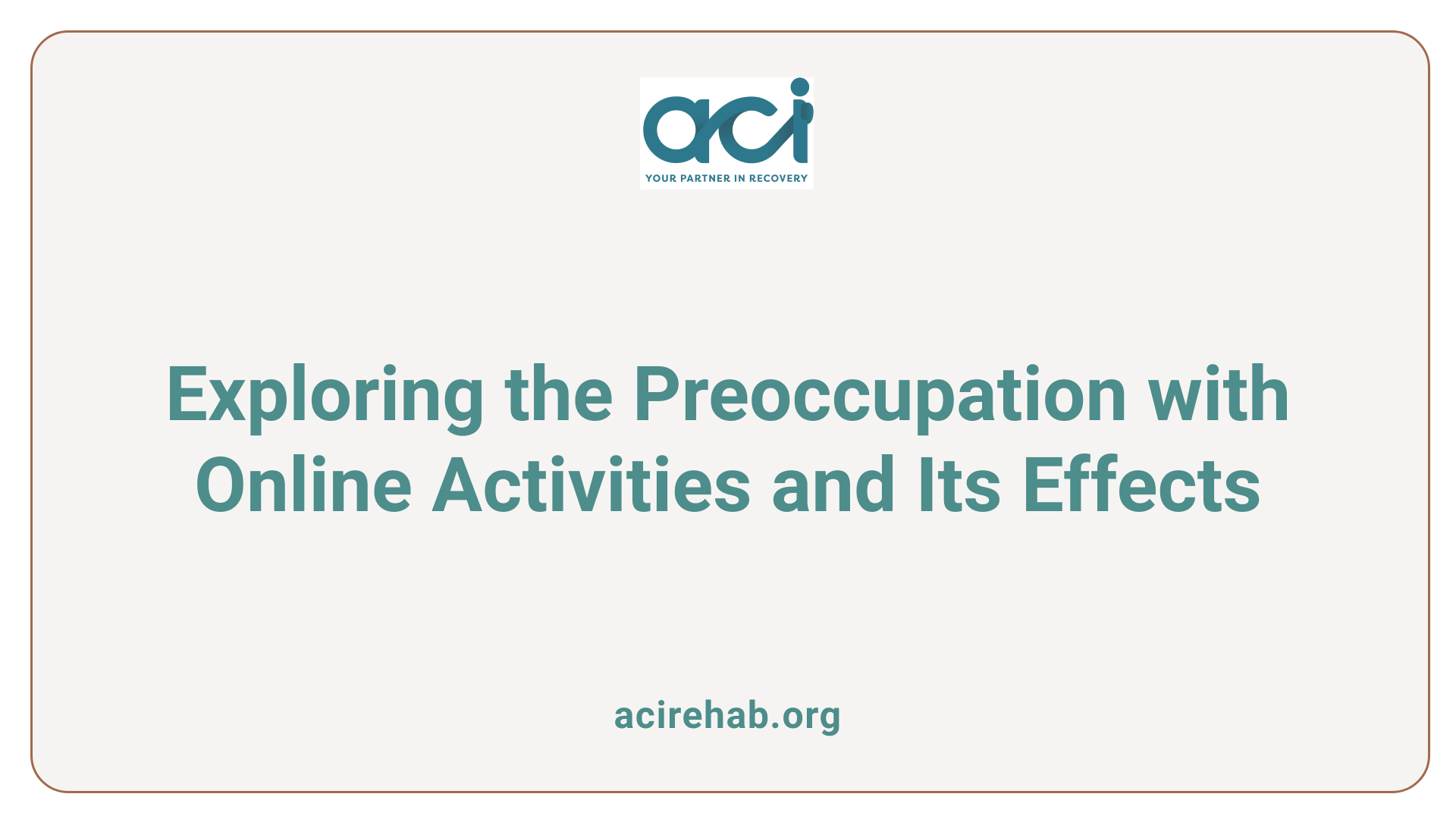
Constant Thoughts About Online Activities
Preoccupation with the internet is a significant symptom of internet addiction, particularly among teenagers. This manifests as a constant stream of thoughts about online interactions, notifications, and social media updates. Teens may find themselves daydreaming about their online personas or planning their next gaming session even when they’re engaged in offline activities. This mental engagement can lead to a reduction in focus on important tasks like schoolwork or family responsibilities.
The need to stay connected can become all-consuming, where thoughts about the internet overshadow other aspects of life. In fact, about 60% of teens aged 13-17 recognize that their internet usage can be a significant issue. The constant desire to check notifications and updates creates a cycle of distraction that can quickly spiral into compulsive behavior.
Difficulty Concentrating on Tasks Without Internet Access
Teens struggling with internet addiction often face difficulties concentrating on tasks when they are not online. Research indicates that prolonged exposure to the fast-paced nature of digital media can lead to impaired attention spans and lower cognitive function. For instance, a teen might find themselves unable to focus during a class or while doing homework, leading to subpar academic performance.
This lack of concentration can be attributed to disrupted brain pathways, causing challenges in working memory and attention control. Withdrawal symptoms, such as irritability and restlessness, can further exacerbate their inability to concentrate when disconnected from the internet. The overall effect is a significant decline in productivity and engagement in other activities, highlighting the importance of recognizing and addressing this preoccupation as a serious concern.
6. Failed Attempts to Reduce Internet Use
Recognizing Excessive Internet Use
Many teenagers today are aware of their excessive internet usage. Surveys indicate that a significant number of teens self-report their internet habits as problematic. Despite this awareness, they often find it difficult to cut back. This struggle can stem from various factors, such as the overwhelming nature of social media, the addictive qualities of online gaming, or the fear of missing out (FOMO) on social interactions.
Psychological Challenges
The failed attempts to reduce internet use can lead to multiple emotional challenges. Frustration is common; teens trying to cut back may experience feelings of helplessness and anxiety. As they grapple with these emotions, their obsession with being online can intensify. This negative spiral can lead to withdrawal symptoms, such as irritability or restlessness, further complicating their efforts to engage in offline activities.
Emotional Impact on Daily Life
The psychological impact of these failed attempts is significant. Teens may develop low self-esteem, believing they lack self-control or the discipline to manage their online habits. As they become increasingly isolated, they may choose to disconnect further from real-life relationships, which can exacerbate feelings of loneliness and depression.
Broader Implications
Ultimately, the inability to temper their internet usage leads to detrimental outcomes, including declining academic performance, which can provoke anxiety over future prospects. The cycle continues as these teens realize they can’t keep up with their responsibilities while being drawn to their screens, underscoring the profound connection between recognizing the issue of internet addiction and the emotional toll it takes.
| Challenges of Reducing Internet Use | Psychological Effects | Potential Solutions |
|---|---|---|
| Recognizing excessive use | Frustration and helplessness | Open conversations with parents |
| Increased irritability when offline | Low self-esteem | Setting tech-free zones |
| Fear of missing out | Mood swings | Seeking professional help |
| Difficulty engaging in offline activities | Loneliness and isolation | Creating engaging offline alternatives |
7. Physical and Emotional Consequences
How does internet use intersect with negative emotions in teenagers?
Excessive internet use among teenagers can lead to significant physical and emotional consequences. Physically, individuals may experience headaches and eye strain as a result of prolonged screen time. These symptoms arise from extended periods of focus on screens without breaks, leading to discomfort and potential long-term vision issues. Additionally, poor posture from slouching during internet use can contribute to neck and back pain, further impacting their overall well-being.
Emotionally, the consequences can be even more severe. Teenagers often turn to the internet as a coping mechanism for negative feelings, such as anxiety and low self-esteem. This reliance creates a cyclical pattern: they feel compelled to engage online to alleviate their distress, but excessive use ultimately exacerbates these negative emotions. Withdrawal symptoms, like irritability and mood swings, emerge when they are offline, further highlighting this dependency.
Physical Health Risks
| Health Risks | Description | Consequences |
|---|---|---|
| Headaches | Result from prolonged screen exposure and tension. | Interference with daily activities and discomfort. |
| Eye strain | Caused by staring at screens without breaks. | Possible long-term vision problems. |
| Poor posture | Related to slouching and lack of physical activity. | Neck and back pain, reduced mobility. |
Emotional Health Challenges
| Emotional Issues | Description | Potential Effects |
|---|---|---|
| Anxiety | Increased worry and fear, often escalating online activity for relief. | Heightened distress and social withdrawal. |
| Low self-esteem | Feelings of inadequacy compounded by social media comparisons. | Negative self-image and emotional instability. |
Recognizing these intertwined physical and emotional impacts is crucial. As teens navigate their digital lives, understanding the consequences of internet addiction on both fronts underscores the need for balanced online engagement and support systems that encourage healthier coping strategies.
Effective solutions might include creating tech-free zones at home, fostering open discussions about online habits, and seeking professional guidance when necessary. While many view internet use as a harmless pastime, the ramifications can be profound, especially amidst the growing mental health concerns surrounding youth today.
General Effects of Teen Internet Addiction
What are the general effects of internet addiction on teenagers?
Teen internet addiction can have profound impacts on various aspects of a young person’s life. One of the most critical areas affected is daily functioning. Adolescents who are excessively engaged online may struggle with everyday activities such as eating, sleeping, and focusing on schoolwork. They may lose the ability to manage their time effectively, often sacrificing sleep to engage in online activities or gaming.
Experts debate the appropriateness of labeling excessive screen time as addiction, suggesting it more accurately reflects compulsive behavior rather than a formal mental health disorder. Currently, the American Psychiatric Association acknowledges ‘internet gaming disorder’ as a potential condition but has yet to fully recognize a broader category for internet addiction. This highlights the importance of further research in understanding the nuances of internet-related issues among youth.
Correlation between excessive use and mental health issues
The psychological ramifications of internet addiction are significant. Studies indicate a strong correlation between excessive internet use and various mental health challenges, particularly anxiety and depression. Adolescents engaged in heavy social media use or online gaming often report feeling isolated or experience distorted self-image, particularly when they compare themselves to their peers. This can exacerbate feelings of loneliness and contribute to a decline in emotional well-being.
Moreover, withdrawal symptoms, such as irritability and restlessness, can emerge when teens are cut off from their screens. These symptoms mirror those seen in other forms of addiction, indicating a troubling dependency on technology for emotional regulation.
While the internet can foster positive social interactions, the potential for negative outcomes cannot be overlooked. It is crucial for parents and guardians to take an active role in monitoring and regulating their children’s screen time. Setting boundaries can help teens find a more balanced approach, ensuring the internet serves as a tool for connection rather than a source of distress.
Taking Action Against Internet Addiction
Parents, educators, and mental health professionals need to be aware of the symptoms of teen internet addiction to provide timely support and intervention. Recognizing these signs is the first step in addressing the issue and helping teenagers find a healthier balance in their internet use. Through open communication, setting boundaries, and possibly seeking professional assistance, teens can learn to engage with technology responsibly while maintaining their overall well-being.
References
- 7 Symptoms of Internet Addiction in Teens Exposed
- Teen Electronic Addiction
- Internet Addiction: How to Spot It in Your Teens
- Is Internet Addiction Real? – Child Mind Institute
- 7 Symptoms of Teen Internet Addiction – Legends Recovery Center
- Internet Addiction: Signs, Symptoms, Causes, and Treatment Options
- [PDF] Teen Internet Addiction: Signs, Symptoms and Recommendations
- Symptoms of Teen Internet Addiction
- 7 Symptoms of Teen Internet Addiction – Attain Behavioral Health

